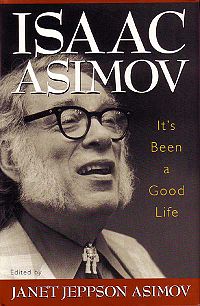
It's Been a Good Life
Encyclopedia

Prometheus Books
Prometheus Books is a publishing company founded in August 1969 by Paul Kurtz, who also founded the Council for Secular Humanism and co-founded the Committee for Skeptical Inquiry. He is currently the chairman of all three organizations. Prometheus Books publishes a range of books, including many...
(ISBN 1-57392-968-9), is a collection of Isaac Asimov
Isaac Asimov
Isaac Asimov was an American author and professor of biochemistry at Boston University, best known for his works of science fiction and for his popular science books. Asimov was one of the most prolific writers of all time, having written or edited more than 500 books and an estimated 90,000...
's diaries, personal letters, and a condensation of his three earlier autobiographies:
- In Memory Yet GreenIn Memory Yet GreenIn Memory Yet Green, In Memory Yet Green: The Autobiography of Isaac Asimov, 1920-1954, is the first volume of Isaac Asimov's two-volume autobiography. It was published in 1979. This first volume covers the years 1920 to 1954, which lead up to the point just prior to Asimov becoming a full time...
, (1979, Doubleday) - In Joy Still Felt, (1980, Doubleday)
- I. Asimov: A memoir, (1994, Doubleday)
Janet's primary role was in choosing the entries and occasionally editing them so the reader would know the people of whom he was speaking. In one case, her edited version is less explicit than Isaac's original. Isaac and "a famous man" debate anti-Semitism
Anti-Semitism
Antisemitism is suspicion of, hatred toward, or discrimination against Jews for reasons connected to their Jewish heritage. According to a 2005 U.S...
(chapter 23 of the book). The famous man voices opposition to scientists since some had aided the Holocaust, and Isaac nearly replies that this is exactly the same as condemning the Jews for crucifying Jesus
Jesus
Jesus of Nazareth , commonly referred to as Jesus Christ or simply as Jesus or Christ, is the central figure of Christianity...
. The edited version omits the celebrity's name—Elie Wiesel
Elie Wiesel
Sir Eliezer "Elie" Wiesel KBE; born September 30, 1928) is a Hungarian-born Jewish-American writer, professor, political activist, Nobel Laureate, and Holocaust survivor. He is the author of 57 books, including Night, a work based on his experiences as a prisoner in the Auschwitz, Buna, and...
.
The epilogue contains a significant new revelation about Asimov's life. Janet Asimov revealed that Isaac had apparently died of AIDS
AIDS
Acquired immune deficiency syndrome or acquired immunodeficiency syndrome is a disease of the human immune system caused by the human immunodeficiency virus...
complications. He contracted it from a blood transfusion
Blood transfusion
Blood transfusion is the process of receiving blood products into one's circulation intravenously. Transfusions are used in a variety of medical conditions to replace lost components of the blood...
during heart bypass surgery in 1983. She says that the reason it was kept secret was that Isaac did not want to deal with the stigma often associated with having the disease.

